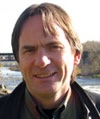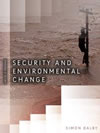Introducing
 Professor Simon Dalby obtained his Ph.D. (on cold war geopolitics) at Simon Fraser University.
Professor Simon Dalby obtained his Ph.D. (on cold war geopolitics) at Simon Fraser University.
He works at Carleton University in Ottawa, teaching courses in political geography, and is co-editor of the Geopolitics journal. Professor Dalby is specialised in critical geopolitics, environmental security and the geographical dimensions of global politics.
In this interview, Professor Dalby discusses the results of his research into the many aspects of security that spans more than 20 years. He talks about the Cold War, global warming, the ideas of Thomas Hobbes and John Locke, geographical imaginations, political discourses and so on. Professor Dalby concludes the interview with suggesting possible roles of geographers in improving global and local security conditions. This is part 3 of the interview. The other parts are:
Interview
Climate change, human security and geographers
What effect does/should climate change have on traditional conceptualisations of security?
 The now rapidly changing climate and the potential disruptions this is beginning to set in motion challenge modern notions of security fundamentally.
The now rapidly changing climate and the potential disruptions this is beginning to set in motion challenge modern notions of security fundamentally.
In geographical terms security is about protecting a supposedly vulnerable domestic space from external threats, and doing so by using surveillance and technological violence to prevent boundary crossing disruptions encroaching on modern societies. But it is precisely the modern carboniferous capitalism that produces the weapons and the wealth that are the methods and objects of security, that has set climate change in motion.
In addition to climate change there are many other major changes such as, bio-diversity reduction, ocean acidification, habitat disruption, re-plumbing most of the worlds waterways and so on that now provide the changing global context for humanity.
The threat to climate, and the disruption of ecologies in many places is carbon-fuelled modernity; that’s us, not them! Indeed modernity caused climate change is precisely what is threatening agricultural populations in Asia and Africa in particular, and there isn’t much those peoples can do about it despite their resulting insecurities.
How would you define human security and what are the most common effects on it of climate change?
Human security is such a loose formulation that it, like most security concepts, defies a precise definition.
In the key 1994 United Nations Development Report human security was understood as the necessary preconditions of safety that would allow development to happen. The environmental dimensions of this formulation were particularly vaguely specified in the early formulations, and given the multiple links between environment and humanity this was wise.
Insecurities are context dependent, and how people are insecure matters in terms of where they are. However as we live in an increasingly artificial world it is clear that entitlements, or simply wealth allows for modes of life in numerous places where technology and the reliable functioning of long commodity chains are key to human existence.
Urban humanity is dependent or resource peripheries and very distant manufacturing facilities for its existence, and this is changing how we understand security.
What could geographers do (more) to improve human security conditions around the world?
We are already working on many of the key themes of insecurity that relate to the changing global political economy, and investigating vulnerabilities in many places.
Understanding the interconnections between places and peoples and the interrelationships between environmental change and vulnerabilities in the urban system at a global scale matters greatly in terms of human security. But thinking much more carefully about how danger is formulated in contemporary politics still needs attention; if the poor are seen as a security threat to the rich rather than as fellow citizens in need of assistance, then human security is not what will be provided.
Likewise thinking much harder about how to produce food in more sustainable ways needs our attention given the coming climate disruptions. This too will have to tackle the political economy of industrial agriculture.
But most of all geographers need to be better at explaining humanity’s role in changing the biosphere, the only planet we’ve got. The self imposed dangers we are unloosing within the system are key to dealing with security in coming decades, and if studying the earth as our home is geography’s scholarly task, we have much work to do educating people and intervening in the big political discussions of what is to be done in the new circumstances that modern industrial society has made.
Geopolitics is now literally about what kind of a planet we are collectively making, although commentators and scholars have been slow to shift their focus to the new artificial circumstances we live in, ones that are changing how we are made secure.
Much political commentary and scholarship is still preoccupied with matters of preparing for war and worrying about the rivalries that political elites devote most of their attention to. Politics is still about who is in charge, much more than it is about what it is that whoever is in charge is in charge of!
The new conditions of an increasingly unstable biosphere require us to think about more than simply securing the existing political order; the task now is to think about new modes of political organisation that are much more cooperative and adaptive if we are concerned about human security for the majority of humanity.
Otherwise, if security is understood only in national terms, and as a matter of maintaining the existing unsustainable and highly unequal system, humanity may face an increasingly violent and insecure future.

Pingback:Wallerstein’s World Systems Analysis: What it means for the Capitalocene, and the blame game. | Capital Crisis In Nature